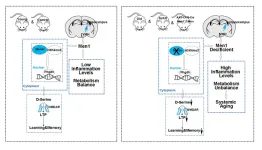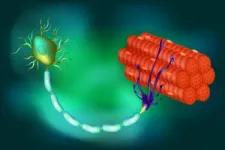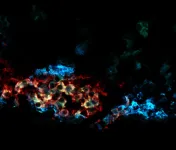(Press-News.org) Decline in the hypothalamic Menin may play a key role in aging, according to a new study publishing March 16th in the open access journal PLOS Biology by Lige Leng of Xiamen University, Xiamen, China, and colleagues. The findings reveal a previously unknown driver of physiological aging, and suggest that supplementation with a simple amino acid may mitigate some age-related changes.
The hypothalamus has been recognized as a key mediator of physiological aging, through an increase in the process of neuroinflammatory signaling over time. In turn, inflammation promotes multiple age-related processes, both in the brain and the periphery.
Recently, Leng and colleagues showed that Menin, a hypothalamic protein, is a key inhibitor of hypothalamic neuroinflammation, leading them to ask what role Menin may play in aging. Here, they observed that the level of Menin in the hypothalamus, but not astrocytes or microglia, declines with age. To explore this decline, they created conditional knockout mice, in which Menin activity could be inhibited. They found that reduction of Menin in younger mice led to an increase in hypothalamic neuroinflammation, aging-related phenotypes including reductions in bone mass and skin thickness, cognitive decline, and modestly reduced lifespan.
Another change induced by loss of Menin was a decline in levels of the amino acid D-serine, known to be a neurotransmitter and sometimes used as a dietary supplement found in soybeans, eggs, fish and nuts. The authors showed this decline was due to loss of activity of an enzyme involved in its synthesis (which was in turn regulated by Menin).
Could reversing age-related Menin loss reverse signs of physiological aging? To test that, the authors delivered the gene for Menin into the hypothalamus of elderly (20-month-old) mice. Thirty days later, they found improved skin thickness and bone mass, along with better learning, cognition, and balance, which correlated with an increase in D-serine within the hippocampus, a central brain region important for learning and memory. Remarkably, similar benefits on cognition, though not on the peripheral signs of aging, could be induced by three weeks of dietary supplementation with D-serine.
There is much left to be learned about Menin’s role in aging, including the upstream processes that lead to its decline, and there is much to learn about the potential for exploiting this pathway, including how much phenotypic aging can be slowed, and for how long, and whether supplementation with D-serine may trigger other changes, yet to be discovered.
Nonetheless, Leng said, “We speculate that the decline of Menin expression in the hypothalamus with age may be one of the driving factors of aging, and Menin may be the key protein connecting the genetic, inflammatory, and metabolic factors of aging. D-serine is a potentially promising therapeutic for cognitive decline.”
Leng adds, “Ventromedial hypothalamus (VMH) Menin signaling diminished in aged mice, which contributes to systemic aging phenotypes and cognitive deficits. The effects of Menin on aging are mediated by neuroinflammatory changes and metabolic pathway signaling, accompanied by serine deficiency in VMH, while restoration of Menin in VMH reversed aging-related phenotypes.”
#####
In your coverage, please use this URL to provide access to the freely available paper in PLOS Biology: http://journals.plos.org/plosbiology/article?id=10.1371/journal.pbio.3002033
Citation: Leng L, Yuan Z, Su X, Chen Z, Yang S, Chen M, et al. (2023) Hypothalamic Menin regulates systemic aging and cognitive decline. PLoS Biol 21(3): e3002033. https://doi.org/10.1371/journal.pbio.3002033
Author Countries: China, United States of America
Funding: see manuscript
END
Colorectal cancer among young people is increasing globally and rapidly. Experts expect it to become the leading cause of cancer death in individuals aged 20-49 in the U.S. by the year 2030.
Yet no one is certain why this disease is suddenly affecting so many young people. In a new paper published in Science, Dana-Farber Cancer Institute researchers outline the complexities of the disease and the research needed to map out a path toward understanding it.
“The rising incidence of young-onset colorectal cancer is extremely concerning, and it is urgent that the scientific community comes together to better understand the underlying ...
New findings help answer a particularly vexing evolutionary question: how do species that use bright coloration to keep predators away survive long enough for this warning signal coloration to evolve, before predators who can better spot them through their colors learn to avoid them? A study comparing a series of models points to warning color signaling, or aposematism, likely appearing through intermediate steps where coloration is only visible when an organism is fleeing or intentionally displaying a hidden feature. Evolutionary selection to avoid being eaten by predators has driven considerable variation in the diversity of animal ...
The common commensal gut bacterium Bacteroides thetaiotaomicron uses phase separation of the transcription termination factor Rho to colonize and thrive in the mammalian gut, according to a new study in mice. The findings suggest that phase separation may also be vital for other important gut microbes and relevant for novel microbiome-based clinical applications. The gut microbiota plays a critical role in human health. Manipulating gut commensal communities could provide promising therapeutic pathways for treating a host of diseases. However, this goal requires understanding mechanisms that enable ...
In 2021, China unilaterally announced that it would stop building new coal-fueled power plants overseas, which was lauded as an important climate milestone. However, this decision stands in contrast to the nation’s continued support for the domestic use of coal plants. In a Policy Forum, Christoph Nedopil discusses this dichotomy and provides new insights into how these decisions were made. According to Nedopil, the findings could inform efforts to improve environmental cooperation with China. China has become the world’s greatest source of greenhouse gas emissions, and its international influence through trade, ...
A new process that lets scientists chemically cut apart and stitch together nanoscopic layers of two-dimensional materials — like a tailor altering a suit — could be just the tool for designing the technology of a sustainable energy future. Researchers from Drexel University, China and Sweden, have developed a method for structurally splitting, editing and reconstituting layered materials, called MAX phases and MXenes, with the potential of producing new materials with very unusual compositions and exceptional properties.
A “chemical scissor” is a chemical designed to react with a specific compound to break ...
Pneumococcal disease leads to over three million hospitalizations and hundreds of thousands of deaths annually. A study publishing March 16th in the open access journal PLOS Biology by Carlos J. Orihuela at the University of Alabama at Birmingham, Alabama, United States, and colleagues suggests that the FDA-approved drug Fomepizole may reduce disease severity in the lungs of mice with some forms of bacterial pneumonia and enhance the efficacy of the antibiotic erythromycin as well.
Streptococcus pneumoniae is the leading cause of community-acquired ...
Losing Key Type of Pancreatic Cell May Contribute to Diabetes
Multiple types of beta cells produce insulin in the pancreas, helping to balance blood sugar levels. Losing a particularly productive type of beta cell may contribute to the development of diabetes, according to a new study by Weill Cornell Medicine investigators.
In the study, published March 16 in Nature Cell Biology, Dr. James Lo, associate professor of medicine at Weill Cornell Medicine, and colleagues measured gene expression in individual beta cells collected from mice to determine how many different types of beta cells exist in the pancreas. The team discovered four distinct beta cell types, including one that stood out. ...
The TU Dresden Spin-off Seamless Therapeutics Launches with $12.5M Seed Financing to Advance Transformative Gene Editing Platform Based on Programmable Precision Designer Recombinases in Dresden
Seed round co-led by Wellington Partners and Forbion, with additional non-dilutive financial support from the BMBF (GO-Bio funding) enables maturation of the proprietary platform and pipeline towards first clinical evaluation
Seamless Therapeutics, a Dresden based start-up of the Technische Universität Dresden, today announced a $12.5 million (€11.8M) seed financing round which will accelerate further development ...
PASADENA, Calif. — A Kaiser Permanente study confirms the benefit of nirmatrelvir-ritonavir, also known as Paxlovid, as an early-stage treatment to prevent hospitalization for people with mild to moderate COVID-19, regardless of prior immunity or age. The study was published March 15, 2023, in Lancet ID.
“Among Kaiser Permanente members in Southern California who tested positive for coronavirus infection, receiving Paxlovid within 5 days of the start of COVID-19 symptoms was associated with substantial reductions in the risk of hospital admission or death,” said Sara Tartof, PhD, the senior author of the study and an epidemiologist with the Kaiser ...
Criteria used by neurologists to assess for multiple sclerosis (MS) in adults may fail to identify the illness in children with imaging suspicious for the disease, an oversight that could delay treatment of the disease at its earliest stages, according to a Rutgers study.
Magnetic resonance imaging (MRI) is the primary tool used for diagnosis of MS, and doctors have applied various standards over the years to classify those most likely to develop the disease. The most recent standard, known as the McDonald criteria, was last updated in 2017.
In some cases, imaging suspicious for MS is found incidentally ...



